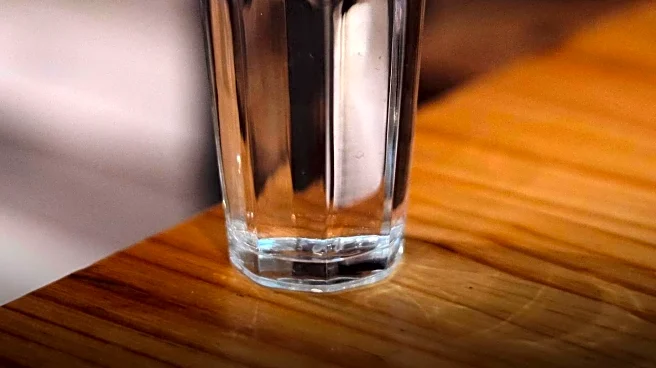What's Happening?
As the colder months approach, maintaining proper hydration remains crucial despite the drop in temperature. Renee Fitton, a registered dietitian and director of education at L-Nutra, addresses common misconceptions about daily water intake, such as the 'eight-by-eight'
rule, which suggests drinking eight 8-ounce glasses of water daily. Fitton emphasizes that hydration needs vary based on factors like body size, activity level, climate, and health status. The adequate intake for men is 15.5 cups (3.7 liters) and for women is 11.5 cups (2.7 liters), but individual needs may differ. Fitton advises monitoring urine color as a personalized hydration indicator, aiming for light yellow rather than clear or dark urine.
Why It's Important?
Proper hydration is essential for overall health, affecting physical performance, cognitive function, and mood. In winter, people may overlook hydration due to reduced thirst signals, leading to potential dehydration. This can result in symptoms like headaches, fatigue, and dry skin. Understanding personal hydration needs can prevent these issues and support bodily functions such as circulation and temperature regulation. Fitton's advice helps individuals tailor their water intake to their lifestyle, promoting better health outcomes and preventing dehydration-related complications.
What's Next?
Individuals are encouraged to experiment with hydration techniques to find what works best for them. Fitton suggests integrating water intake into daily habits, such as drinking water upon waking or before meals, and using apps like WaterMinder for reminders. As winter progresses, people should remain vigilant about their hydration levels, adjusting their intake based on activity, climate, and personal health indicators like urine color. This proactive approach can help maintain optimal hydration throughout the colder months.
Beyond the Headlines
The discussion around hydration highlights broader health and wellness trends, emphasizing personalized approaches to health management. As people become more aware of their unique needs, they may seek tailored solutions beyond generic health advice. This shift could influence public health recommendations and encourage innovation in hydration-related products and services.

















